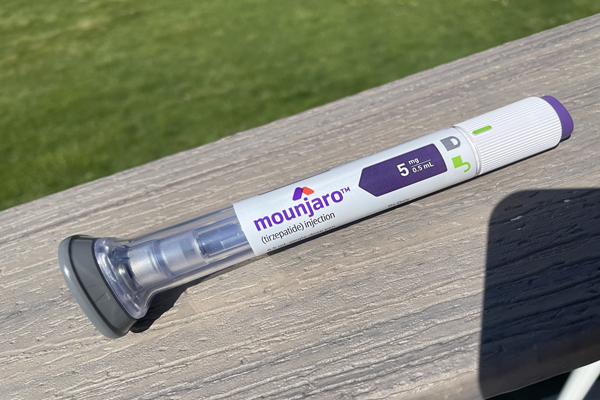No products in the basket.

Have you heard about Mounjaro and its potential for weight loss? Originally developed as a treatment for type 2 diabetes, this medication has gained attention for its significant impact on body weight. In this blog post, we’ll explore what Mounjaro is, how it works to promote weight loss, and what you need to know if you’re considering it as part of your weight management journey.
Mounjaro is the brand name for tirzepatide, a medication approved in the UK for managing type 2 diabetes. You can find it in a group of medicines called dual glucose-dependent insulinotropic polypeptide (GIP) and glucagon-like peptide-1 (GLP-1) receptor agonists. While its primary role is to help regulate blood sugar levels, clinical trials have shown that it also leads to substantial weight loss in many patients, sparking interest in its potential beyond diabetes care.
Mounjaro’s ability to aid weight loss stems from its unique action on two key receptors: GLP-1 and GIP. Here’s how it works:
This dual mechanism is thought to provide a more powerful weight loss effect compared to medications that target only the GLP-1 receptor, making Mounjaro a standout option in weight management research.
Clinical studies have demonstrated Mounjaro’s impressive weight loss potential. In the SURMOUNT-1 trial, specifically designed to evaluate tirzepatide for weight loss, participants taking the highest dose (15 mg) lost an average of 22.5% of their body weight over 72 weeks. This result is remarkable, often exceeding what’s typically achieved with other weight loss medications or lifestyle changes alone. However, individual outcomes can vary, and medical supervision is essential when using Mounjaro for this purpose.
Mounjaro may be an option for adults with a body mass index (BMI) of 30 or higher (classified as obesity) or 27 or higher (overweight) with at least one weight-related condition, such as type 2 diabetes, high blood pressure, or high cholesterol. In the UK, Mounjaro is primarily licensed for type 2 diabetes, but its weight loss benefits have led to discussions about its use in obesity management. If you’re considering it for weight loss, consult your doctor to see if it’s suitable for your circumstances.
As with any medication, Mounjaro comes with potential side effects. The most common includes:
These are usually mild to moderate and tend to lessen over time as your body adjusts. More serious but rare risks include pancreatitis and, based on animal studies, a potential link to thyroid tumours. Mounjaro is not recommended for individuals with a personal or family history of medullary thyroid carcinoma or multiple endocrine neoplasia syndrome type 2. Always discuss the risks and benefits with your healthcare provider.
The administration of Mounjaro involves a once-weekly subcutaneous injection, typically in the abdomen, thigh, or upper arm. This weekly schedule can be convenient for those who prefer not to take daily tablets, though some may find injections less appealing.
While Mounjaro can significantly aid weight loss, it’s not a magic fix. For the best results, it should be paired with a balanced diet and regular exercise. Sustainable lifestyle changes can boost the weight loss achieved with Mounjaro and help you maintain it over time, making it a valuable tool within a broader weight management plan.
In summary, Mounjaro offers a promising option for those looking to lose weight, especially if you have type 2 diabetes or weight-related health issues. Its dual action on GLP-1 and GIP receptors reduces appetite and supports weight loss, backed by strong clinical evidence. However, it’s vital to use it as part of a comprehensive approach, guided by a healthcare professional. If you’re curious about whether Mounjaro could help you achieve your weight loss goals, speak to your doctor to find out more.